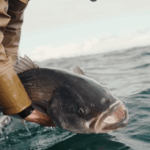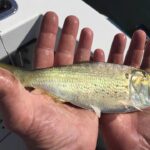
No, Striped Bass Are Not “Back” in North Carolina
This week, an Axios Raleigh article made the rounds claiming there may have been a
Tony Friedrich, Vice President/Policy Director
We know this is late and we are sorry for that. We had a podcast, some policy platforms, and a bunch of other odds and ends that we waited on until after the striped bass decision was made. Better late than never, right?.
First things first, we would like to offer a heartfelt thanks to the entire conservation community. Every single person who wrote an email, attended a meeting, and/or made a social media post, made an enormous difference. After years of feeling like your comments didn’t matter, you were finally rewarded with a win at the May 5th meeting of the Atlantic States Marine Fisheries Commission’s (ASMFC) Striped Bass Board. You all need to remember that. It is worth your time to save this iconic species because your voices are overwhelming.
Let’s run down what was removed, what stayed in, and what that means for Amendment 7 (click here for some background on the Amendment 7 process and our views on each of the issues). We are going to give you the short and sweet version first, then at the end of this article, we will do a little editorializing. If podcasts are more your speed, we also hosted a rapid reaction episode of The Guide Post summarizing what went down.
Issue-by-Issue Summary:
1. Goals and Objectives: Removed
This is a major conservation victory. If the bad states started messing with this, it would have been a heavy lift to stop them.
2. Reference Points: Removed
This is another major victory and a massive blow to all the folks who wanted to have less striped bass in the water forever.
3. Management Triggers: Will be in Amendment 7
Management triggers are the series of guiding indicators that signal a current or future fall in the striped bass population. There is still a chance this could be a problematic issue. There is another side of the coin though. What if the conservation community rose up again and demanded we have MORE conservation-minded triggers? That is our plan. We are going through the triggers and will certainly have some robust suggestions. We will make sure to let you know what you can do to help.
4. Stock Rebuilding Schedule: Removed, Plus an Addition to Protect the 2015 Year Class
Ten years is long enough. In fact, many of us feel that we should see options for the recovery to be less than 10 years. This was another win for conservation. Megan Ware, commissioner from Maine, tacked on another win for conservation by suggesting we do something to protect the 2015 year class. We can only hope that the 2015’s don’t get annihilated before this action can come to pass.
5. Regional Management: Removed
This was the fourth leg on the table of despair presented to you from the states that want to kill more fish. Let’s be honest here for a second. We are not doing a great job of managing one stock. Furthermore, regardless of origin, small fish contribute to the coastal stock once they reach adult size. Finally, the science is not ready for this. So, much to the chagrin of Mike Luisi from Maryland’s Department of Natural Resources, Issue 5 was also kicked to the curb.
6. Conservation Equivalency: Will be in Amendment 7
This could be the end for the way conservation equivalency (CE) has been used. You want to know how badly it was abused? Here are some states that opted to not use CE and their harvest reductions from last year. Remember, each needed to achieve an 18% reduction. NH down 79%. MA down 66%. Maine down 50%. The states that preferred CE had a different outcome. MD down only 4% while NJ had a 26% increase and Virginia saw a 17% increase as well.
We want CE to be in the amendment because we want to change how it can be used forever. Maybe you aren’t allowed to use it if the stock is overfished? Maybe we should increase the probability of success to meet the needed reductions from 50% to 75% or greater if a state chooses to use CE when the stock is healthy? There is a lot going on here. Much like Management Triggers, we are going to put the pedal to the metal on this issue and help guide you through the process.
7. Release Mortality: Will be in Amendment 7
While it’s important to recognize that post-release mortality will always be a reality in a predominantly recreational, predominantly catch-and-release fishery, we support efforts to further address this challenge in the amendment. We are also encouraged by the ongoing research from the Massachusetts Division of Marine Fisheries on release mortality of striped bass. This research will enable us to make better informed decisions on striped management.
8. Recreational Accountability: Removed
We are all for recreational accountability–for striped bass and other species–but this is a larger issue than just the striped bass fishery, and it needs to be addressed in a broader context. The Striped Bass Board largely agreed.
9. Commercial Allocation: Removed
This was removed from a fear of slowing down the process. As one would imagine, reallocating a commercial quota will be a hotly contested issue. Because of this, it will be handled as a separate issue.
10. Other Issues: To be revisited at the August Striped Bass Board Meeting
—
As we stated, we won a serious victory, but why? Did the commissioners suddenly have a change of heart? Is ASMFC going to start doing the right thing? The story is a little more complicated than a simple Hallmark moment.
First, we have a different Secretary of Commerce now. Why does that matter? If a state decides to reject a fisheries management plan, there is a process in place to address the situation. The Secretary of Commerce ultimately has the final say. Well, in the last four years, recreational anglers went out of compliance twice and appealed the decision all the way up to the Secretary of Commerce. Both times, the previous Secretary, Wilbur Ross, gave the green flag on overfishing. To frame the significance of this, it was the first time in 80 years that the Secretary overruled NOAA. First, it was with red snapper, followed by summer flounder. This emboldened commissioners like Mike Luisi of Maryland to have a standing threat of going out of compliance on striped bass. This isn’t a guess or hearsay. It is actually the reason why Maryland was allowed to get a smaller fish via circle hooks several years ago. I know, as I was the person who suggested circle hooks so Maryland DNR could get a minimum size reduction rather than pursue non-compliance. They don’t have that leverage anymore. Secretary Raimondo, the previous governor of Rhode Island, won’t allow overfishing on striped bass. This was a devastating blow to the harvest more crowd and an incredible change of fate for the conservation community.
Secondly, there are strong calls for reforming ASMFC on the federal level. We will dive into the details of this in an upcoming blog but for now just know that some commissioners are aware of this. They know that if these efforts gain traction, ASMFC will never again be able to break their own rules with zero accountability.
Certainly, there are thanks in order to the true conservation minded commissioners: Megan Ware (ME), Ritchie White (NH), Mike Armstrong (MA), and Justin Davis (CT), among others. So, thank you from all of us. But, make no mistake, there was a lot of other stuff that guided this victory. For the bad players, you are now stuck between a rock and a hard place just like the conservation community was with the previous Secretary of Commerce. It isn’t a fun place to be, is it?
Moving Forward:
ASMFC’s Plan Development Team will now go to work preparing the draft amendment for the four approved issues, which the Board will review during its October meeting. After that meeting, if approved, the draft Amendment 7 will go out for public comment just like the PID. We will have until the next meeting in February 2022 to shape the Amendment, so that it truly represents what the angling community wants from striped bass fishing.

This week, an Axios Raleigh article made the rounds claiming there may have been a

Feature Photo Credit: Robbie Tartaglia What’s going on? For decades, striped bass management relied on a

Recent developments in the 2025 Atlantic Menhaden Stock Assessment Update, released by the Atlantic States

What’s going on? The “most important fish in the sea” just exposed one of the
We rely on our members and donations to keep fighting for a sustainable tomorrow in marine conservation.
GIVE THE GIFT OF FISHERIES CONSERVATION THIS HOLIDAY SEASON. SHOP ASGA GOODS THAT FUND FISHERIES RESEARCH & ADVOCACY CAMPAIGNS
JOIN ASGA IN CALLING FOR CRITICAL MANAGEMENT ACTION AFTER YEARS OF SPAWN FAILURES & POOR MANAGEMENT.
By using this website, you agree to our use of cookies. We use cookies to provide you with a great experience and to help our website run effectively. To learn more, please review our privacy policy.
4 Responses
Thank you for the status update on amendment 7. I look forward to the next step in this process.
Tony
Am I correct to conclude ASGA and CCA/MD are in agreement regarding Reference Points?
thanks.
Gregg